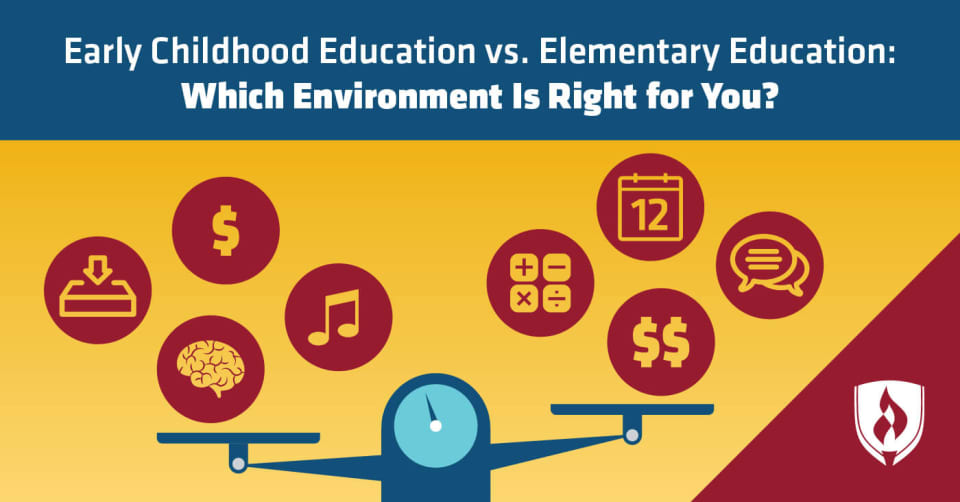Early Childhood Education vs. Elementary Education: Which Environment is Right for You?
By Brianna Flavin on 05/23/2016

When you love kids, it’s tough to choose between a group of adorable, wide-eyed toddlers and more independent, clever (and equally adorable) elementary students. Choosing a degree that leads to the career of your dreams is a big decision. It’s not something anyone should take lightly.
If you know you enjoy working with children and have a passion for improving the future of our society, education is a field that will allow you to do both. But how can you narrow down options?
Early childhood education (ECE) focuses on the academic, social and cognitive skills that develop in children from birth through preschool. Elementary education refers to the primary education that comes after preschool but before middle school (typically kindergarten through fifth or sixth grade.)
There are definite distinctions between the two sectors that are important to understand. We’re here to help you make an informed decision about early childhood education versus elementary education. We combined government information, real-time job market data and expert insight to provide you a side-by-side comparison below.
Keep reading to see which option is the best fit for you!
ECE vs. elementary education: skills needed
To start, it’s helpful to understand what knowledge and proficiencies are needed to succeed in each position. This will help you start to gauge where your skills and interests lie.
Early childhood education
We used real-time job analysis software to examine more than 70,000 preschool jobs posted over the past year.1 The data helped us identify the ten most desired skills employers are seeking in prospective preschool teachers:
- Child development
- Child care
- First aid
- Lesson planning
- Cleaning
- Music
- Psychology
- Record keeping
- Case management
- Scheduling
In addition to the skills above, there are some important personality traits that many successful ECE teachers share. Patience is near the top of the list, as it’s difficult wrangling a group of hyper toddlers or trying to decipher a broken sentence when one is trying to relay a message. The ability to think creatively is important as well, to devise fun, unique ways to teach a lesson.
“The primary personal attribute that differentiates a preschool teacher from an elementary school teacher is being extremely high energy,” says art and music educator Sabrina Peña Young. Young speaks from experience teaching ECE, elementary and all ages through post-secondary. She emphasizes that being physically expressive in the classroom is particularly important for ECE teachers.
“My ability to dance, sing and sometimes just make a fool of myself as I enjoy the music keeps their attention, engages them and lets them see that even adults can have fun,” Young adds.
Elementary education
We conducted a similar search of nearly 70,000 elementary teacher jobs posted over the past year to analyze the ten skills employers were seeking most2:
- Lesson planning
- Mathematics
- Collaboration
- Staff development
- Scheduling
- Curriculum development
- Workshops
- First aid
- Community relations
- Decision making
You’ll notice there is some overlap in the skills needed for ECE versus elementary education, which should be expected. When teaching this older group of students, there is more organization and collaboration involved with other teachers. There is also more of an emphasis on the strategy and logic of the curriculum.
“When I teach elementary school students, organization and energy go hand-in-hand,” Young says. But because older children have a higher attention span and better verbal communication, Young focuses less on kinetic activities and more on engaging multiple learning styles.
Teaching elementary still demands energy, Young points out, but a different kind of energy. “The focus is more on engaging the students in a variety of activities that include learning key concepts and course objectives.”
ECE vs. elementary education: required education
Don’t be intimidated if you don’t feel comfortable with all of the skills included above. Both teaching specialties have training and education requirements to help equip you in all of these areas.
Early childhood education
The degree requirements for ECE depend on the school and your role in the classroom. You can land a job in a childcare center or as an assistant teacher by earning an ECE certificate. If you hope to become a preschool teacher, the most common requirement is an associate degree.
Elementary education
Earning a bachelor’s degree along with state licensure is the most typical route for aspiring elementary educators. But if you’re looking to teach at a private school, you don’t necessarily need state licensure. If you hold a degree other than education, such as math or science, you can become an elementary teacher after passing an alternative teacher certification exam. You will also likely need references.
ECE vs. elementary education: job outlook
Now you’re familiar with what you need to know and the credentials you’ll need to be qualified. You’re probably curious now about the job growth and earning potential for each secter.3
Early childhood education
Employment for preschool teachers is expected to increase seven percent through 2024, according to the U.S. Bureau of Labor Statistics (BLS). This is about as fast as the average for all occupations. While the preschool-age population is expected to increase, their overall share of the population will likely remain constant, which explains the steady growth projection. The BLS adds that acquiring a degree will likely increase your job prospects for these positions.
Elementary education
The BLS projects kindergarten and elementary school jobs to grow at a steady rate of six percent through 2024. Since education is often intertwined with districts and state governance, certain states have better employment opportunities than others. To see where your state falls, see Employment for Elementary School Teachers by State.
The BLS predicts more opportunities for elementary teachers with degrees and certifications. Job prospects also increase in urban and rural school districts compared to suburban school districts.
One difference between ECE and elementary education career paths is likely due to the additional experience and licensure required to be an elementary teacher, along with the lack of national standardization in preschools. However, if the push for Universal Pre-K becomes a reality, the outlook and salary for preschool teachers could change dramatically.
Which is right for you?
Helping teach and empower the next generation is rewarding at any level. In comparing early childhood education versus elementary education, each has its own unique pros and cons. We laid out the information for you, but we can’t make the decision for you.
The best choice for you truly comes down to preference and personality. If you find yourself curious about other career option in the education industry, download a complimentary copy of our Education Career Guide.
Related Articles:
- Montessori Schools vs. Reggio Schools: The Differences in these ECE Disciplines
- Education Experts Share 10 Tips for Dealing with a Difficult Child
1 Burning-Glass.com (analysis of 73,421 preschool teacher job postings, Apr. 01, 2015 – Mar. 31, 2016)
2 Burning-Glass.com (analysis of 69, 655 elementary teacher job postings, Apr. 01, 2015 – Mar. 31, 2016)
3 Bureau of Labor Statistics, U.S. Department of Labor, Occupational Outlook Handbook, [information accessed March 2016] www.bls.gov/ooh/. Employment conditions in your area may vary.
*Graduates of Early Childhood Education programs at Rasmussen University are not eligible for licensure as a teacher in an elementary or secondary school. A Bachelor’s degree and a state teaching license are typically required to work as a teacher in public and private school settings.
EDITOR'S NOTE: This article was originally published in June 2013. It has since been updated to reflect information relevant to 2016.




